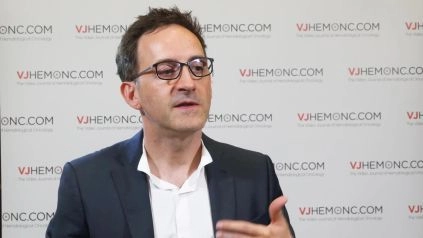Christoph Röllig, MD, from the University Hospital Carl Gustav Carus, Dresden, Germany, discusses the rationale behind determining the most suitable treatment for a patient with acute myeloid leukemia (AML). The most reasonable choice of treatment for a patient with a genetic cause of AML, such as an isocitrate dehydrogenase (IDH) mutation or tyrosine kinase overexpression, is a form of immunotherapy that directly targets the specific mutation. Dr Röllig explains how early clinical trial data and detecting minimal residual disease levels after targeted therapy can be used to determine drug efficacy. This interview was recorded at the 2018 European School of Hematology (ESH) Clinical Updates on Acute Leukemias, held in Budapest, Hungary.
[the_ad id="32629"]

